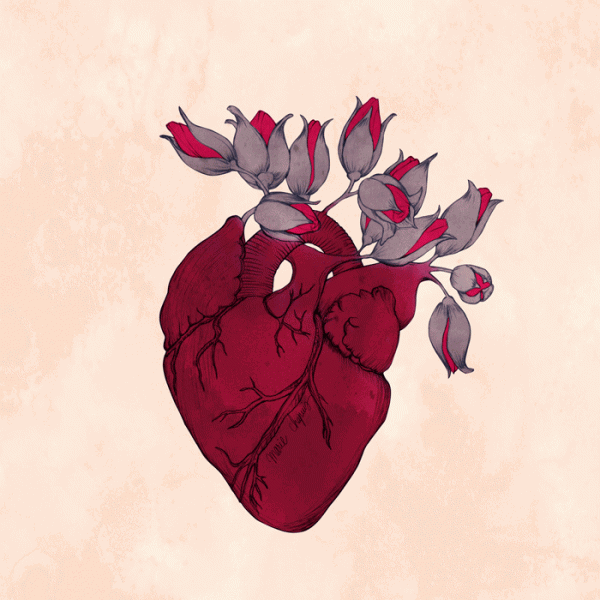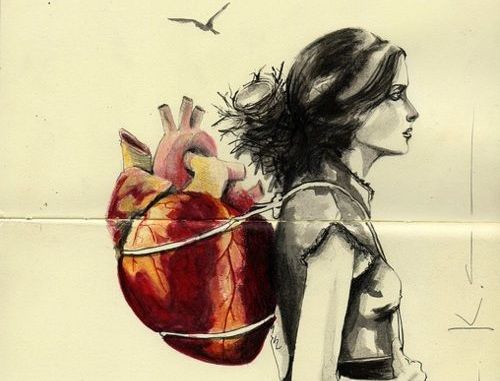The Heart Has Neurons Too

Most people don’t know this, but the heart can feel, think, and decide for itself. It has around 40,000 neurons and a whole network of neurotransmitters with very specific functions, which makes it a perfect extension of the brain.
It’s interesting that when we refer to ourselves, we commonly put our hands over our hearts. It’s automatic, almost instinctive, as if a mysterious, primal voice were telling us that the center of our true being, our conscience, is located right there.
“Those who love from the heart, speak from the heart.”
-Francisco de Quevedo-
That voice isn’t completely wrong; the fantastic and revealing field of neuroscience sheds light on the processes that we sometimes sense but don’t understand. The heart is closely linked to the brain, so much so that it’s constantly sending information to it and even activating and inhibiting various areas of the brain depending on certain bodily needs.
You might like to know, for example, that emotions like love – as well as its manifestation through affection, tenderness, and care – come from this exceptional complex of cells, nerves, energy, and electricity that make up who we are. We are perfectly engineered to interact with our environment and fellow humans.
We encourage you to go beyond the simple metaphor that “we also think with the heart” to understand all of the wonders found right there inside your chest.

The heart is an intelligent organ
The heart is an emotionally intelligent organ. This seems like a redundant thing to say, or even too poetic for it to have any real meaning. However, think about the following for a moment: when you cultivate positive emotions characterized by calm, balance, and true, complete satisfaction, your heart rate is rhythmic and perfect.
However, factors like stress, anxiety, and fear completely disrupt this balance. The waves suddenly start to jump in non-harmonious, even dangerous spikes. The heart knows very well which emotions help you connect better with others. Just as an example, it is responsible for for producing certain hormones, like ANP, which, among other functions, is responsible for stimulating the release of of oxytocin, the hormone involved with care, affection, and love.
Annie Marquier, a well-known mathematician and researcher of consciousness, explains that since the heart has around 40,000 neurons and benefits from positive moods and relaxed states, it would be good to practice contemplation, silence, and relaxation each day as a way to connect harmoniously with your environment.

Remember that the heart is an incredible vessel with a truly superior intelligence, as positive emotions are ultimately what reinforces our health. In fact, the heart even regulates these emotions using a series of hormones.
Below, we’ll explain a little more how it does this.
The three connections of the heart
We said at the beginning that the heart has a pretty complex nervous system where neurotransmitters, proteins, and support cells are concentrated. Does this mean that the organ that gives us life is sentient?
Almost. But rather than a rational organ, it’s a purely sensing organ that can make decisions for itself based on certain stimuli. The most interesting part is that, just like neurologists and cardiologists explain, the heart can act independently from the brain. What’s more, it can even learn through experience.
Let’s take a look at how this is achieved through a series of connections established between the heart and the brain.
“To love intensely, there must be peace in the heart.”
First connection
This is certainly an interesting piece of information to reflect on. Of all the cells in the heart, 67% are nerve cells. It is the only organ that can send information autonomously to the brain based on the organic stimuli it receives.
Second connection
Our hearts are responsible for homeostasis. This means that among its many vital functions, it also guarantees our emotional balance.
It does this by inhibiting stress through prioritizing the release of hormones like oxytocin. In this way, it acts like an additional endocrine gland. In fact, it is thought that it even works in collaboration with the amygdala.

Third connection
Our hearts are characterized by a very powerful electromagnetic communication system. In fact, it’s 5,000 times more powerful than the brain.
However, its electromagnetic field varies with emotions. Different studies done by the HeartMath Institute showed that the quality of one’s emotions can alter or regulate the electromagnetic field generated by the heart.
This is quite fascinating, and scientists have a very clear understanding of something that we’ve all experienced firsthand: positive emotions result in true psycho-physiological coherence.
Humans are a wonderful accumulation of energy, impulses, sensations, and perceptions guided by two exceptional organs: the brain and the heart. But the latter is more than just the classic pump that makes blood circulation possible; it also gives life to the thing that makes us human: emotions.
This text is provided for informational purposes only and does not replace consultation with a professional. If in doubt, consult your specialist.








